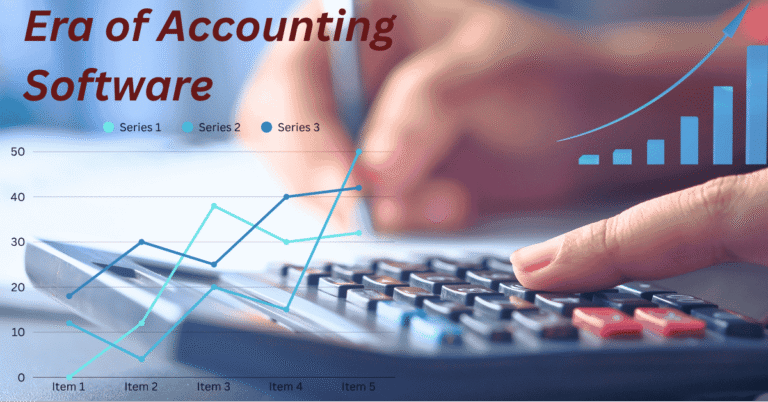5 Best Software For Small Business Accounting
Small businesses are the backbone of the world economy. To develop in a competitive environment, they must maintain precise financial records and make good financial decisions. Accounting software has become a fundamental tool in helping small businesses to achieve these goals.
It clarifies complicated accounting tasks, increases accuracy, and empowers better financial management. This article delves into the different types of accounting software used by small businesses and their benefits.
The Importance of Accounting Software
Accounting software regulates and unifies different financial processes, minimizing manual work, saving operational time and the risk of errors. It assists businesses to record income and expenses, automatically manage invoices and payroll, prepare financial reports, and adherence to tax regulations.
These tools offer user-friendly solutions to small business owners who have limited knowledge of accounting in order to maintain the financial health of the business.

Types of Accounting Software
There are many types of accounting software used to meet the requirements of different businesses. These software include:
- Desktop Accounting Software
This software is installed directly on a computer and is suitable for businesses that promote local data storage. Sage 50 Cloud and QuickBooks are examples of Desktop accounting software.
- Cloud-Based Accounting Software
This software is available on the internet and offers flexibility and data access from different devices. QuickBooks Online, Xero, and FreshBooks are the best examples of Cloud-Based accounting software.
- Enterprise Resource Planning (ERP) Systems
These are more exhaustive systems that incorporate accounting with other business functions such as management of inventory, human resources, and customer relationship management. Usually, larger firms use these, and some ERP systems are designed for growing small businesses.

Prominent Accounting Software For Small Businesses
QuickBooks
QuickBooks is one of the most extensively used accounting software solutions for small businesses. It provides both desktop and cloud-based versions. The following are the Key features of QuickBooks:
- Invoicing and payment processing
- Expense tracking and budgeting
- Integration of payroll
- Tax preparation tools
- Financial reporting
QuickBooks is also known for user-friendly software and scalability, making it suitable for various industries.
Xero
Xero is a cloud-based accounting software particularly designed for small and medium-sized businesses (SMEs). It allows a broad range of features that are mentioned below:
- Bank reconciliation
- Inventory tracking
- Invoicing and billing
- Financial reporting
- Third-party app integrations
Xero’s emotional interface and mobile app make it a favorite among business owners and accountants.
FreshBooks
FreshBooks is another famous cloud-based accounting solution, particularly for service-based businesses and online businesses like freelancers. The following are the key features of FreshBooks:
- Time tracking and project management
- Automated invoicing and payment reminders
- Expense and mileage tracking
- Reporting and dashboards
- Client communication tools
FreshBooks is highly appreciated for its simplicity and friendly customer support.
Wave
Wave provides free accounting software with interesting and helpful features, making it an attractive choice for startups and very small businesses. Features of a wave are mentioned below:
- Invoicing and payments
- Expense tracking
- Bank connections
- Financial reporting
Even though it’s free, Wave maintains a professional quality and may lack some advanced features available in paid software.
Zoho Books
Zoho Books is the emerging part of the Zoho suite of business applications and contains a powerful accounting solution for small businesses. The following are the main features of Zoha Books:
- Invoicing and billing
- Project tracking
- Inventory management
- Tax compliance tools
- Automation of workflows
Zoho Books integrates well with other Zoho applications, offering a comprehensive business solution.
Benefits of Using Accounting Software
- Time Efficiency: The use of accounting software saves time while performing routine tasks and reduces other administrative jobs previously performed by manpower.
- Accuracy: Recording of entries through automation helps prevent errors and ensures accurate and precise financial records for the preparation of fair financial statements.
- Real-Time Access: This software is are Cloud-based solutions that offer up-to-date financial information on the basis of recent trends and is easily accessible for stakeholders from anywhere.
- Improved Cash Flow Management: Features of this software, like invoice processing, reminders, and expense tracking, help businesses to manage their cash flow properly in order to meet liquidity criteria for current liabilities.
- Tax Preparation: This software can simplify tax filing by managing records, calculation liabilities, and generating necessary forms that are required for tax preparation.
- Scalability: Various accounting software solutions upgrade with the business, offering advanced features as needed for business competitions.
- Compliance: Built-in compliance tools are available in this software to ensure businesses adhere to tax laws and financial reporting standards.

Challenges And Considerations
Although accounting software offers many advantages, here are some challenges that small businesses should consider:
- Learning Curve: Various software can be complicated and require more time to learn.
- Cost: Although different tools are affordable, premium features or user licenses can incur additional costs in order to get advanced features.
- Data Security: Cloud-based solutions need trust in the provider’s security measures and prevent data from leakage that can damage the reputation of the business.
- Integration: Not all software integrates logically with other tools the business uses.
To mitigate these challenges, businesses should conduct thorough research, analyze reviews, and try to test software through free trials.
Choosing The Right Accounting Software
When selecting accounting software, small businesses should determine the following key factors:
- Business Size and Complexity: Larger businesses with more transactions may require more advanced software that should cover all challenges that a business faces.
- Budget: Allocation of budget is compulsory for the procurement and upgrading costs of the software.
- Features: Always select software that meets current requirements but also allows for future growth of its functions.
- User-Friendliness: Choose a software interface that minimizes the learning curve and enhances efficiency.
- Support and Training: Excellent customer support for any assistance need by businesses and training resources provided by the software can make a big difference with optimal utility.
- Integration: Always check the compatibility of software with existing tools such as CRM, payroll, and banking systems for the smooth operations of the business.
Conclusion
Small businesses are now using accounting software as a major tool to manage financial activities efficiently and effectively. With a broader range of options available, from QuickBooks and Xero to FreshBooks and Wave, businesses can obtain solutions according to their unique requirements.
The right software can advance operations, improve the accuracy in business transactions, and support business growth from all perspectives. Investing in the right accounting tools by small businesses can achieve more of what they want to achieve, serve their customers in good manners and grow their enterprise.
Related Articles:
- Payroll Advance: Powerful Ways to Enhance Workplace Morale
- Powerful Mobile Marketing Strategies You Must Try
- Best Marketing Tools In An Advertising Plan
- Mastering Revenue Expenditure for Business Success
- Market Research And Its Importance: A Comprehensive Review
- What You Should Know? Notes Payable And Accounts Payable
- Digital Marketing And Strategies: A Comprehensive Review with Examples
- Are Annuities the Best Investment for a Bright Future? A Comprehensive Analysis
- Understanding Capital Expenditure: Definition, Significance, and Its Association in Financial Decision-Making
- Difference Between Accounting And Finance: A Proven Comprehensive Guide For Beginners
- Difference between Annuity due and Ordinary Annuity
- Essential Accounting Software for Small Enterprises







